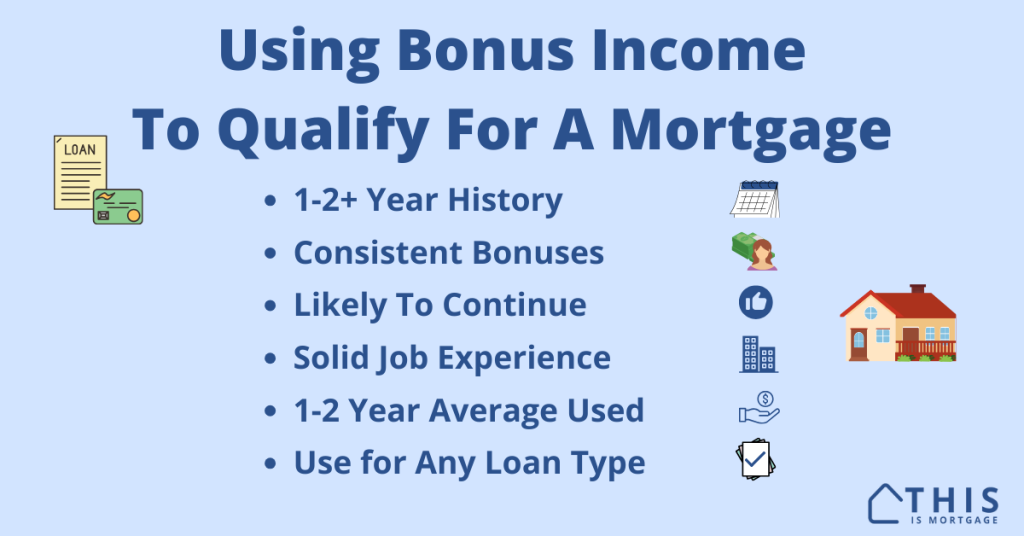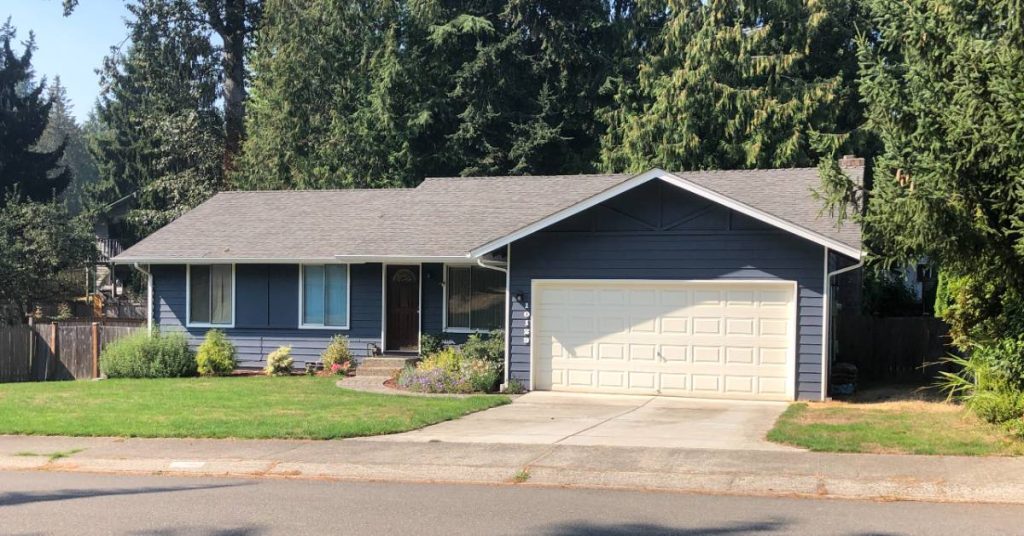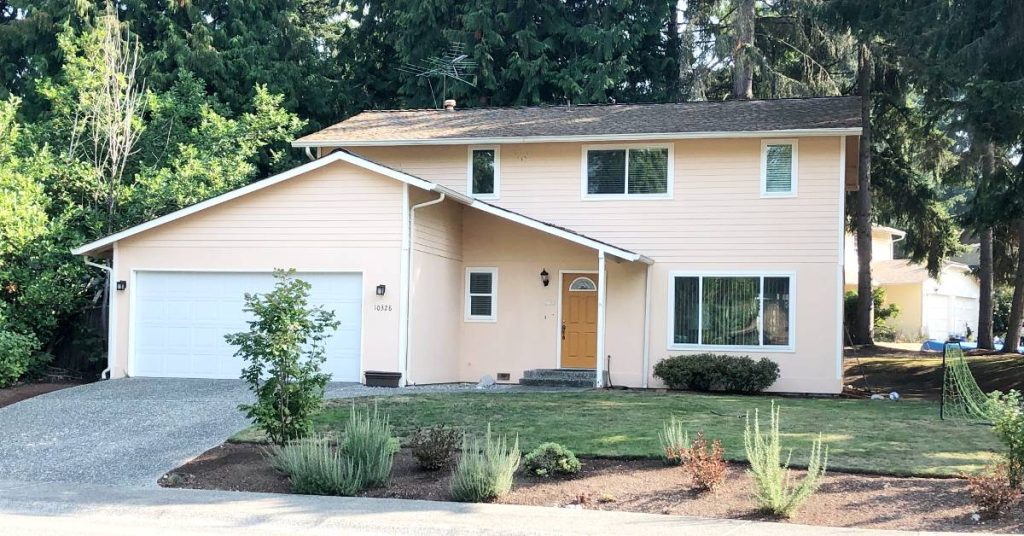If you earn bonus income consistently, it can help you qualify for a mortgage.
Here are guidelines for FHA loans, plus rules for other programs.
See if your bonus income qualifies you for a mortgage.
- FHA rules for bonus income
- How the lender calculates bonus income
- Calculation of base salary versus bonus
- Bonus less than 2 years: FHA, conventional, USDA, VA
- How often do you receive your bonus?
- One-time bonuses
- Can you count future bonus?
- Changing jobs: can you use expected bonus?
- Documentation
- Things that jeopardize bonus income for qualification
- Bonus income earner? You may qualify to buy a home.
FHA rules for bonus income
The key ingredient to use bonus income for an FHA loan or other loan types is history.
Generally, you need two years of bonus income history. However, FHA and other programs require just one year if the bonus appears likely to continue.
Those with 12-24 months of bonus income may need to show compensating factors, which is discussed later in the article.
Request your bonus income review here.
How the lender calculates bonus income
For FHA, the lender will use one of the following to calculate qualifying bonus income:
- Your average bonus income from the last two calendar years
- If less than 2 years, the full amount of time bonus has been received
- Your most recent 12-month average bonus if lower than the two options above
For example, you earned $20,000 in bonus income two years ago, but $10,000 last year. The lender will use $10,000, or $833 per month as your bonus.
The lender will convert bonus income into a monthly number for qualifying purposes, even if it’s received just once or twice per year.
Following are examples of how much the lender might allow you to use to qualify in different situations. Income used by the lender is →bolded.
| Steady bonus | Declining bonus | Low year-to-date | |
| Two years ago | →$20,000 | $20,000 | $20,000 |
| Last year | →$22,000 | →$10,000 | $22,000 |
| Year-to-date (ex. June) | $11,000 | $6,000 | →$6,000 |
| Calculation | $20k + $22k / 24 months | $10k / 12 months | $6k / 6 months |
| Qualifying Income | $1,750/mo | $833/mo | $1,000/mo |
While lenders mainly focus on the last two calendar years, your year-to-date matters. A low YTD number could make your two-year average irrelevant. The lender will typically use the worst-case scenario when calculating bonus income.
Calculation of base salary versus bonus
The lender does not use a 24-month average of your base salary. Rather, it uses your current base salary level, then adds average bonus income.
For example, you earn $8,000 per month in base salary, up from $7,000 last year. You received a $10,000 annual bonus for the past two years. Qualifying income is $8,833 per month ($8,000 + [$20,000 / 24]).
Bonus less than 2 years: FHA, conventional, USDA, VA
All major loan programs, except VA loans, allow bonus income to qualify with at least 12 months of history.
To take advantage of this exception, you need compensating factors such as:
- Strong history in the same industry
- A large down payment, great credit, and/or financial reserves after closing
- Your bonus income isn’t a majority of your pay
- Reasonable debt-to-income ratio
Specifically, here’s what each program looks for.
FHA: Bonus must be received for at least one year. Additionally, it must appear likely to continue.
Conventional: Minimum one year required, and the “borrower’s employment profile demonstrates that there are positive factors to reasonably offset the shorter income history.”
USDA: One year in the same line of work is required. Bonus that fluctuates 20% higher or lower from the previous 12 months will be analyzed further. Note that USDA has income limits; Bonus income that is expected to be received over the next 12 months from any household member (even those not on the loan) will be added to make sure the household income is within limits. In some cases, bonus may be added for income eligibility purposes but not qualifying purposes.
VA: Two years of history are required. Bonus received at least 12 months but less than 24 may only be used to offset debts that are scheduled to be paid off within two years.
Underwriters often make judgment calls. Approval often depends on conservative-ness of the lender.
If you’re denied, apply with another lender. You may be approved.
Get a lender’s second opinion here.
How often do you receive your bonus?
One thing that makes bonus calculation tricky is timing.
Often, bonuses are received just once or twice per year. So what “counts” as one year history?
Typically, the lender will review the length of time at the current employer and position. It wants to see that you’ve been there 12 months and, obviously, received at least one bonus payment.
However, this scenario is still questionable. How does the lender know if next year’s bonus will be higher, lower, or non-existent?
This is where you may need an explanation letter from your employer explaining how it calculates bonus payouts. If by company performance, the employer should state how the numbers compare to last year. The same is true for individual performance bonuses.
(The lender will use this information solely to build the case that bonus income is likely to continue, not calculate the qualifying amounts.)
Employers are often hesitant to project bonus numbers, but anything they can say, even in general terms, will help your case.
Bonuses paid 2, 4, or 12 times per year are better for mortgage qualifying since the lender can see and calculate history. Much will come down to the underwriter’s judgment for yearly bonuses.
One-time bonuses
By definition, a signing bonus or other one-time incentive is not expected to continue. It won’t be counted toward qualifying income.
However, single bonuses are a legitimate source of down payment funds. The lender will count bonuses toward the cash-to-close requirement as long as you’ve saved them in an accessible account.
Can you count future bonus?
Qualifying bonus income will always be based on what you’ve received. You can’t count projected bonus income if, say, you started a job with a bonus structure but have no bonus history.
The lender may use this as a compensating factor, but it won’t help your debt-to-income ratio.
See if you qualify for FHA or another loan type.
Changing jobs: can you use expected bonus?
If you came from a job where you had one to two years of bonus history, then it’s possible, but difficult, to use expected bonus from the new job.
The lender may need to see one or two bonus payments to determine whether it’s likely to continue.
Bonus structures vary drastically between employers and even roles for the same employer. It’s extremely difficult to build a case that bonus income will continue at a new company before you receive a bonus.
The best action plan is to get a solid letter from your employer stating as many details about the bonus structure, and, if they are willing, likelihood of ongoing bonuses.
Documentation
To prove bonus income, the lender will collect:
- Your year-to-date pay stub
- W2s for the last 2 years
- A breakout of base and OT from either
- Your year-end pay stub for the last two calendar years, or
- A verification of employment form
- HR contact information
Because W2s and 1099s don’t break out bonus income from base, the lender will need year-end pay stubs or a salary verification from your employer. These documents break out salary, bonus, overtime, and commission. Some companies rely on third-party services like The Work Number or an internal HR department for these verifications.
Your HR department can tell you how they usually perform verifications of employment.
Things that jeopardize bonus income for qualification
The following are red flags for the lender.
Job changes in the previous 12 months: Job roles and expectations can change dramatically between companies. Expect to supply a strong letter from your employer about expected bonus income if you recently changed companies or roles.
Job gaps: Some lenders will disregard previous bonus pay with job gaps longer than 30 days. The 12-month clock may reset after a job gap.
Declining bonus: If the bonus portion of your income declined in the most recent calendar year or year-to-date, expect to compose a solid letter of explanation. The lender will probably use the worst-case scenario for qualification.
Uncertain continuance: Even with two years of history, a lender can disregard bonus income if it’s not likely to continue. For example, your bonus is based on commercial real estate leasing. The underwriter may disregard prior bonus income since office leasing is expected to severely decline in the post-pandemic economy.
Bonus income earner? You may qualify to buy a home.
Bonus income analysis is complex. Before making an offer on a home, get a fully underwritten pre-approval from a lender. That way there are no surprises when you find a home.
At the very least, you’ll know where you stand and what to work on to get mortgage-qualified.




